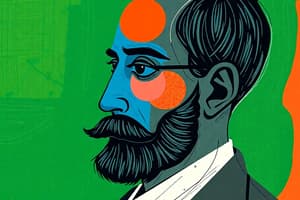Podcast
Questions and Answers
In what year did Wilhelm Wundt establish his psychology laboratory?
In what year did Wilhelm Wundt establish his psychology laboratory?
- 1879 (correct)
- 1885
- 1881
- 1875
What was the primary focus of structuralism as developed by Edward Titchener?
What was the primary focus of structuralism as developed by Edward Titchener?
- The physiological basis of cognition
- The relationship between mind and behavior
- The contents of mental processes (correct)
- The functions of mental processes
How precise was Wundt's apparatus in measuring reaction times?
How precise was Wundt's apparatus in measuring reaction times?
- One-thousandth of a second (correct)
- One-tenth of a second
- One-millionth of a second
- One-hundredth of a second
What type of stimuli were subjects exposed to in Wundt's experiments?
What type of stimuli were subjects exposed to in Wundt's experiments?
What was a common feature of the experimental design in Wundt's psychology laboratory?
What was a common feature of the experimental design in Wundt's psychology laboratory?
What was the primary aim of William James in establishing functional psychology?
What was the primary aim of William James in establishing functional psychology?
Which of the following best describes the core principle of natural selection as accepted by functional psychologists?
Which of the following best describes the core principle of natural selection as accepted by functional psychologists?
How did functionalists differ from structuralists in their approach to psychology?
How did functionalists differ from structuralists in their approach to psychology?
Which method did William James incorporate alongside introspection for studying mental activities?
Which method did William James incorporate alongside introspection for studying mental activities?
What underlying idea is crucial to the concept of adaptation in functional psychology?
What underlying idea is crucial to the concept of adaptation in functional psychology?
Flashcards are hidden until you start studying
Study Notes
Edward Titchener and Structuralism
- Titchener, a student of Wundt, developed structuralism, emphasizing mental process contents over their functions.
- Structuralism sought to analyze the structure of the mind through introspection.
Wilhelm Wundt and the First Psychology Laboratory
- Wundt established the first psychology laboratory at the University of Leipzig in 1879, marking a significant milestone in psychology.
- The laboratory served as a training ground for experimental psychology, focusing on measurement and scientific rigor.
Experimental Methods in Wundt's Laboratory
- Experiments primarily involved measuring reaction times to various stimuli, including light, images, or sounds.
- Subjects were often isolated in a room to ensure unbiased reactions to stimuli.
- Upon receiving a stimulus, subjects would push a button to indicate their reaction, facilitating precise measurements.
Precision of Measurement
- Wundt's apparatus enabled the measurement of reaction times with remarkable accuracy, down to one-thousandth of a second.
- This level of precision underscored the laboratory's commitment to empirical research in psychology.
Founders of Functional Psychology
- William James, John Dewey, and Charles Sanders Peirce were instrumental in the establishment of functional psychology.
- They incorporated Darwin’s theory of evolution by natural selection into their understanding of psychology.
Key Concepts of Functional Psychology
- Natural selection is fundamental in explaining an organism's characteristics and behaviors.
- Adaptation refers to traits acquired by an organism that enhance its survival and reproduction, shaped by natural selection.
Functionalism
- William James defined psychology's purpose as studying the function of behavior within the environment.
- Functionalism emphasizes how mental processes aid in adapting to the surroundings, contrasting with structuralism's focus on individual mental components.
Methodologies in Functional Psychology
- Functionalists preferred examining the whole mind's operation rather than isolating its parts.
- Introspection was used by James as a means to study mental activities, alongside more objective methods.
- Objective measures included recording devices and analysis of tangible outputs from mental functions, as well as anatomical and physiological assessments.
Studying That Suits You
Use AI to generate personalized quizzes and flashcards to suit your learning preferences.




